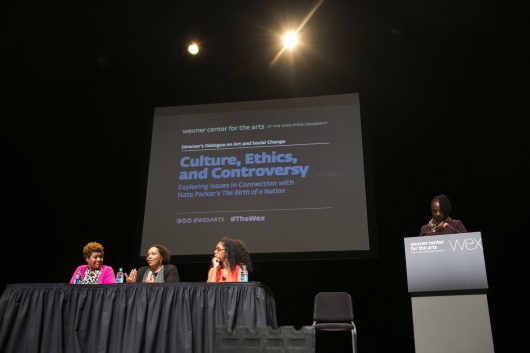
A panel discusses controversy behind “A Birth of a Nation” ahead of The Wexner Center for the Arts’ screening of the film. Credit: Courtesy of Maddie McGarvey
The Wexner Center for the Arts hosted a moderated discussion on Monday in which a panel of professors discussed the ethical, cultural and controversial circumstances surrounding the acclaimed film “The Birth of a Nation.” The organized dialogue was planned after rape allegations arose surrounding Nate Parker, the writer, producer, director and star. The Wex is hosting a sold-out advanced screening of the critically-acclaimed, yet controversial, film Tuesday at 7 p.m.
“The Birth of a Nation” is a feature film that follows the life of slave Nat Turner and the 1831 slave rebellion he led. It won awards at The Sundance Film Festival and was expected to perform favorably before news of Parker’s past rape charges surfaced.
The conversation on the film and the aforementioned current events featured a moderator and panel of three professors from various research and teaching backgrounds. This allowed the panel to cover multiple perspectives on the issue.
The panelists included Joni Acuff, assistant professor in the Department of Arts Administration, Education and Policy; Wendy Smooth, associate professor in the Department of Women’s, Gender and Sexuality Studies; and Leslie Alexander, associate professor in the Department of African American and African Studies. All panelists grappled with the implications, for the film and society at large, the alleged rape presented.
Acuff said identifying with multiple minority identities as an African American woman made reacting to the film all the more difficult.
“Which oppression wins today?” she said.
According to the panelists, what people who are interested in seeing the film must decide is whether the creator and his personal life can be separated from his work. Acuff, for one, believes that the artist and the art is interlaced.
Amber Jackson, a third-year in psychology and women’s, gender and sexuality studies, finds it complicated but ultimately possible to be open-minded when dealing with controversy surrounding an artist.
“It’s always important to think of both sides of the story,” Jackson said. “I think that it’s possible to still appreciate someone’s art despite who they are as a person.”
The college campus promotes great conversation and allows for open discussion, Smooth said.
“(There is a) societal responsibility we collectively share,” she said.
Parker, along with former roommate and co-writer on the film Jean Celestin, was charged with rape at the Pennsylvania State University when he was a 19-year-old college athlete. Parker was acquitted for his part while Celestin was initially convicted, although his case was thrown out after he appealed the verdict. The conversation touched on the many similar circumstances still occurring on college campuses today.
“Over the last 20 years, the number (of sexual assaults on campus) have not changed much,” Smooth said. “We still, as a society, choose not to believe victims.”
The difficulty in achieving legal justice for sexual assault is also an issue still relevant in today’s society, according to Smooth.
“Our justice system fails daily,” she said. “Rape culture is alive and thriving on college campuses.”
Alexander and the other panelists also discussed the pattern of forgiving and forgetting intolerable behavior. She spoke on the politics involved with whose behavior gets forgiven and whose does not. She cited historical figures such as Abraham Lincoln, Thomas Jefferson and Martin Luther King, Jr. as examples of this very problem.
“There are dominant narratives in this society,” Alexander said. “What are we in this society valuing and what are we teaching our young people to value?”
The dialogue set the stage for the film’s premiere at the Wex tonight. The sold-out advance screening of “The Birth of a Nation” will be followed by a question-and-answer session with film scholar Michael Gillespie.


